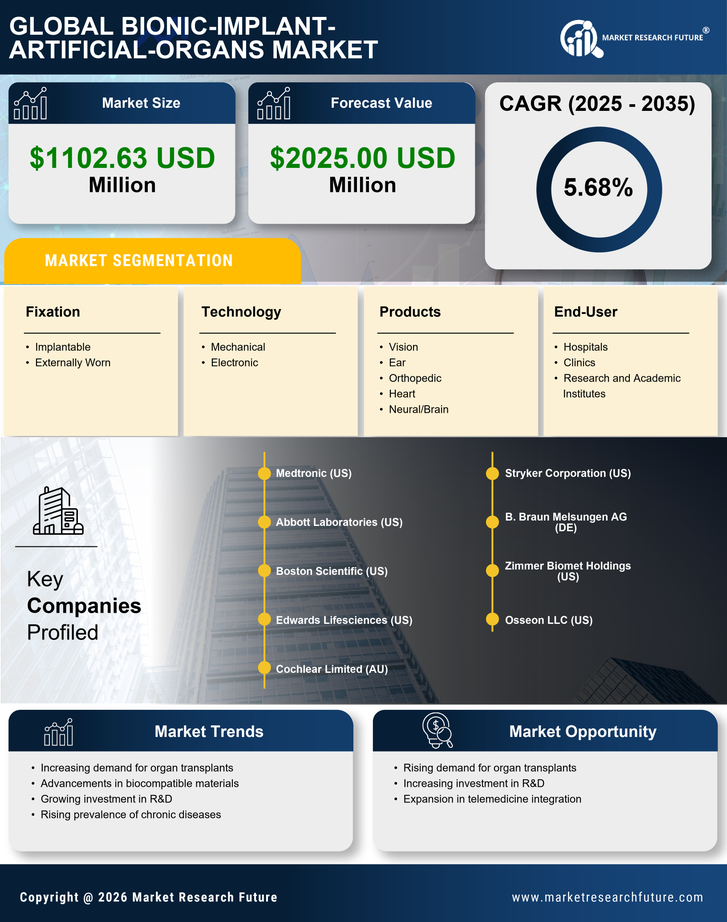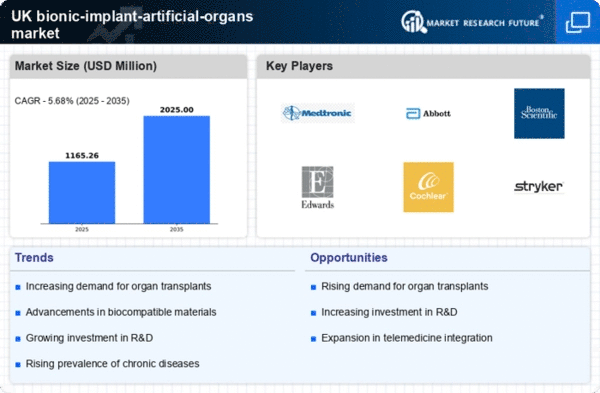Government Initiatives and Funding
Government initiatives aimed at improving healthcare infrastructure and funding for medical research are pivotal in shaping the medical bionic-implant-artificial-organs market. The UK government has committed substantial resources to enhance healthcare services, with an investment of £1.5 billion in medical technology research over the next five years. This funding is expected to support the development of new bionic implants and artificial organs, facilitating faster regulatory approvals and market entry. Additionally, public health campaigns promoting awareness of organ donation and transplantation are likely to complement these efforts, further stimulating market growth. As a result, the medical bionic-implant-artificial-organs market is positioned to benefit from these supportive governmental actions.
Rising Incidence of Chronic Diseases
The increasing prevalence of chronic diseases in the UK is a significant driver for the medical bionic-implant-artificial-organs market. Conditions such as diabetes, heart disease, and renal failure are becoming more common, necessitating advanced medical solutions. According to recent statistics, approximately 3.5 million people in the UK are diagnosed with diabetes, which often leads to complications requiring bionic implants. This growing patient population creates a heightened demand for innovative medical devices that can replace or support failing organs. As healthcare providers seek effective treatments, the medical bionic-implant-artificial-organs market is likely to expand, driven by the need for solutions that enhance patient quality of life and reduce healthcare costs associated with chronic disease management.
Technological Innovations in Implant Design
Technological advancements in the design and functionality of bionic implants are propelling the medical bionic-implant-artificial-organs market forward. Innovations such as biocompatible materials, miniaturization, and smart technology integration are enhancing the performance and acceptance of these devices. For instance, the development of 3D printing technology allows for the customization of implants tailored to individual patient anatomies, improving surgical outcomes. The UK has seen a surge in research and development funding, with investments reaching £200 million in the last year alone, aimed at fostering innovation in this sector. As these technologies evolve, they are expected to drive market growth by offering more effective and user-friendly solutions for patients.
Aging Population and Increased Life Expectancy
The demographic shift towards an aging population in the UK is a crucial factor influencing the medical bionic-implant-artificial-organs market. As life expectancy rises, the incidence of age-related health issues, such as organ failure, is also increasing. The Office for National Statistics reports that by 2040, the number of people aged 65 and over is projected to reach 20 million. This demographic trend creates a growing market for bionic implants that can address the needs of older patients. Healthcare systems are likely to invest more in advanced medical technologies to manage the health of this population, thereby driving demand for innovative solutions in the medical bionic-implant-artificial-organs market.
Growing Awareness and Acceptance of Bionic Solutions
The increasing awareness and acceptance of bionic solutions among patients and healthcare providers are driving the medical bionic-implant-artificial-organs market. Educational initiatives and patient advocacy groups are playing a vital role in informing the public about the benefits of bionic implants and artificial organs. Surveys indicate that over 70% of patients are open to considering bionic solutions for organ replacement, reflecting a shift in perception. This growing acceptance is likely to encourage healthcare professionals to recommend these advanced options more frequently, thereby expanding the market. As patients become more informed about their choices, the demand for innovative medical solutions in the medical bionic-implant-artificial-organs market is expected to rise.

















